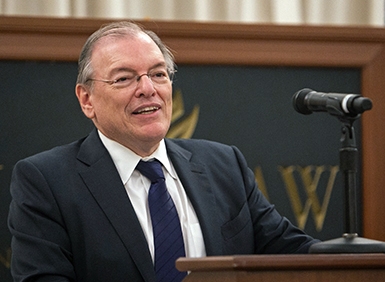In Madison Lecture, Judge Gerard Lynch examines the ambiguity of exercising judicial restraint
Judge Gerard Lynch of the US Court of Appeals for the Second Circuit aimed straight at a much-debated set of questions when he delivered the 51st James Madison Lecture on November 4. In the lecture, titled “Complexity, Judgment, and Restraint,” Lynch considered issues related to how ambiguous legal questions might be answered, whether judges can really be neutral umpires, and the nature of judicial restraint.
Select remarks by Judge Gerard Lynch:
“In the legal academy, there has long been a body of thought that sees the work of judges as a mere mask for the exercise of raw power. Increasingly, our political leaders act as if to reinforce the message of critical theorists, and their actions may help to turn that message from a theory into a reality. The press cannot seem to report the decision of a federal court on any matter without identifying the judges who made the decision by the political party of the president who appointed them. The general public, which has tended to rate the judiciary highest for integrity among the branches of our government, seems increasingly skeptical….”
[06:24-07:12]
“I want to advance two propositions in this talk: first, that there is indeed a class of questions, not insignificant in number, and including many questions that are important and politically salient, to which ordinary legal reasoning does not yield a decisively correct answer, and second, that the belief that there are absolute right answers, which can be reached only by applying a specific methodology, tends to devalue the importance of judicial judgment, and to undermine the practice of judicial restraint, a critical value that can only have real bite in a world in which judges are acknowledged to be exercising judgment.”
[09:11-09:50]
“The recognition that there is not one method that will always yield unanimous answers, or for that matter, that will yield consistently just outcomes, is humbling, and humility is an especially valuable virtue for judges. A belief that one is simply pursuing a strict, objective methodology can lead to a willingness to overturn the judgments of one’s predecessors and of the political branches just as much as a belief that one is entitled to pursue one’s own vision of justice from the bench.”
[1:09:24-1:09:54]
Watch the full video of the lecture (1 hr, 22 min):
Posted December 20, 2019


